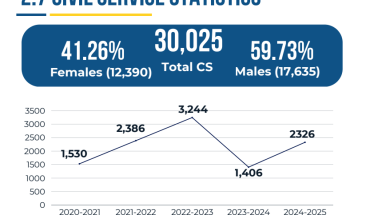
But suicide, drugs, and cybercrime remain persistent threats
KINZANG DORJI TSHERING | Thimphu
Bhutan recorded a general decline in crime cases between January and June 2025, according to Colonel Pasang Dorji, Deputy Chief of Police for Crime and Operations at the Royal Bhutan Police (RBP).
He cautioned, however, that the nation continues to grapple with deeply rooted social issues such as suicide, drug abuse, and the growing threat of cybercrime, all of which require urgent attention from families, schools, and communities alongside law enforcement.
Colonel Pasang Dorji highlighted the worrying rise in suicide cases across the country. Most cases, he explained, are directly or indirectly linked to alcohol abuse, drug dependence, mental health struggles, relationship breakdowns, and neglect of the elderly.
“When people, especially the elderly, are not taken care of by their families, they feel neglected and isolated. That hopelessness can drive them to suicide,” he said, stressing that the problem must be understood as a social issue, not just a law enforcement matter.
Children and youth are also increasingly vulnerable. He recounted tragic cases of students ending their lives over failed romantic relationships.
“One father spent years walking kilometres each day to ensure his daughter attended school, only to lose her to suicide over a short-lived infatuation,” he said.
“We want young people to realize that life is bigger than a temporary relationship.”
Meantime, the RBP has intensified outreach programs in schools, speaking directly to students about the dangers of impulsive decisions.
“Our aim is to make them understand that many others—parents, friends, and society—value their lives far more than they imagine,” he added.
Citizen feedback underscores the importance of family support. Yeshi, a local resident, shared, “We need more open conversations at home and in schools about mental health.” She further noted that youth often struggle silently without proper guidance.
According to Colonel Pasang Dorji, the police recorded a drop in drug-related cases in the first half of 2025 compared to previous years, attribute it to sustained awareness campaigns, community support, and coordinated enforcement.
Recent seizures, however, highlight that Bhutan remains a target for smugglers. In the past two months alone, authorities confiscated consignments of brown sugar and cocaine at Paro International Airport, smuggled in from Bangkok and other transit points.
With Bhutan sharing about 700 kilometers of porous border with India, policing drug routes remain a formidable challenge.
“While overall drug crime is down, the substances entering through borders and airports are more dangerous than ever,” he said.
“Original hard drugs are expensive and not easily accessible, so traffickers are bringing in adulterated and highly damaging substances.”
To counter the trend, he explained that the RBP is tightening airport security and enhancing border surveillance in coordination with Indian counterparts.
“Our responsibility is not only to enforce but also to create awareness within the community. Keeping society clean is a shared duty,” he said.
While traditional crimes showed a decline, cybercrime continues to rise, posing new threats to financial security and personal dignity.
Colonel Pasang Dorji detailed several common schemes, including OTP scams where criminals trick victims into sharing one-time passwords to gain access to bank accounts, and crypto and dollar frauds in which victims are lured into transferring money to fake deals.
Another worrying development is the misuse of artificial intelligence, where young people with advanced computer skills create obscene deep fake images and circulate them online.
One case involved a youth arrested for generating explicit AI-modified images of girls and threatening to share them publicly.
“Technology can be used for good or bad. Unfortunately, some talented youths are misusing their skills for crime,” Colonel Pasang Dorji said. He also urged parents to monitor children’s screen time and online activity closely.
“Children pick up harmful content faster than good content,” he warned. “Parents must take responsibility; police cannot control what happens in every home.”
The RBP also touched on traffic violations, where drivers often blame enforcement agencies rather than acknowledging their own responsibilities.
“Once you are licensed, you carry a responsibility—not only for your life but also for the lives of others on the road,” Colonel Pasang Dorji added.
He highlighted cases of vehicles dangerously overloaded with passengers in rural areas, calling for greater awareness and accountability.
Sangay Choden, a concerned citizen, echoed this concern, saying, “Not always. Reckless driving and overloading are common, especially in rural areas. Road safety campaigns need more visibility.”
Meanwhile, the Royal Bhutan Police is expanding the Grand Monitoring and Control (GMC) system, launched in 2023, which integrates crime monitoring, intelligence-led policing, and CCTV-based surveillance.
Under the initiative, crime hotspots are identified and targeted with focused deployment of officers.
Additionally, CCTV systems have been installed in several urban areas enabling real-time monitoring and quicker response, and border security is being strengthened with new infrastructure and cross-agency collaboration.
According to Colonel Pasang Dorji, the GMC also coordinates between police, army, and other agencies during emergencies and public gatherings to ensure safety and order.
Pasang Dorji repeatedly stressed that crime prevention cannot rest solely on the police. He called for a collective response involving parents, teachers, businesses, and local communities.
“Shopkeepers continue to sell inhalants and restricted substances to minors just to make small profits. They care for their own children but neglect the harm caused to others’ children. This short-sightedness will eventually affect all of society,” he said.
Similarly, in addressing juvenile delinquency, he clarified that the focus is not to arrest and punish children but to instil fear of consequences and guide them back to school.
“We warn them, scold them, and hand them back to their parents. The goal is to prevent future crimes, not criminalize children,” he added.
Finally, the RBP urges all citizens to prioritize national interest over personal interest, cooperate with law enforcement, and remain vigilant against emerging crimes.
“Overall, crime is down, drugs are down, and people are more willing to report cases—even sensitive ones like rape and domestic violence,” Colonel Passang Dorji said.
“This progress is due to both police efforts and the support of the public. If everyone—parents, teachers, shopkeepers, community leaders—takes responsibility, we can build a society where crime approaches zero.”





